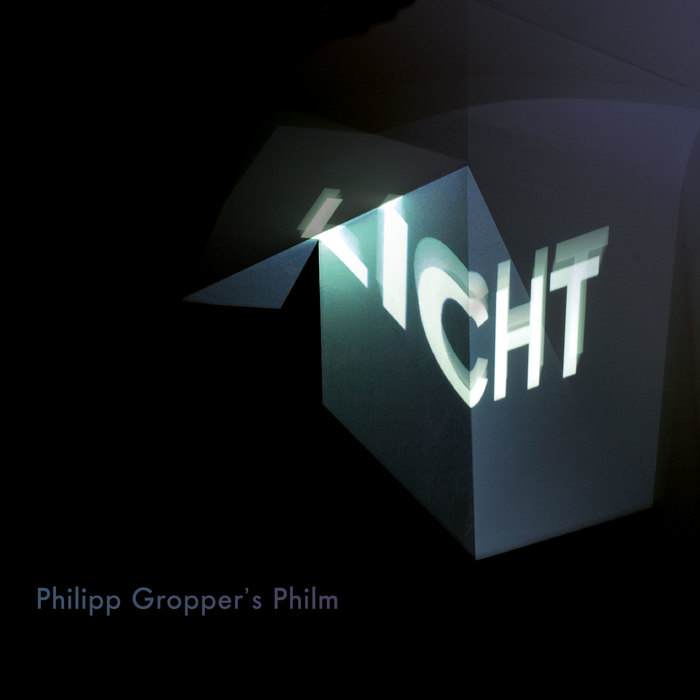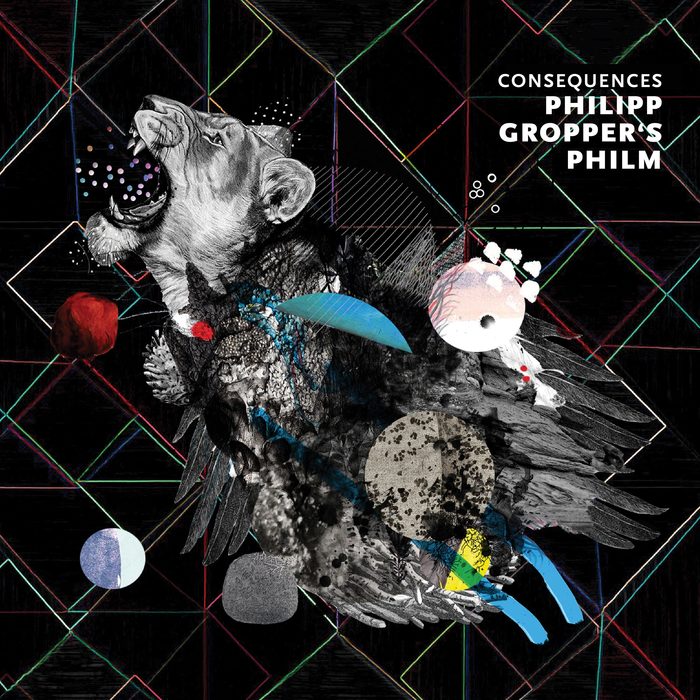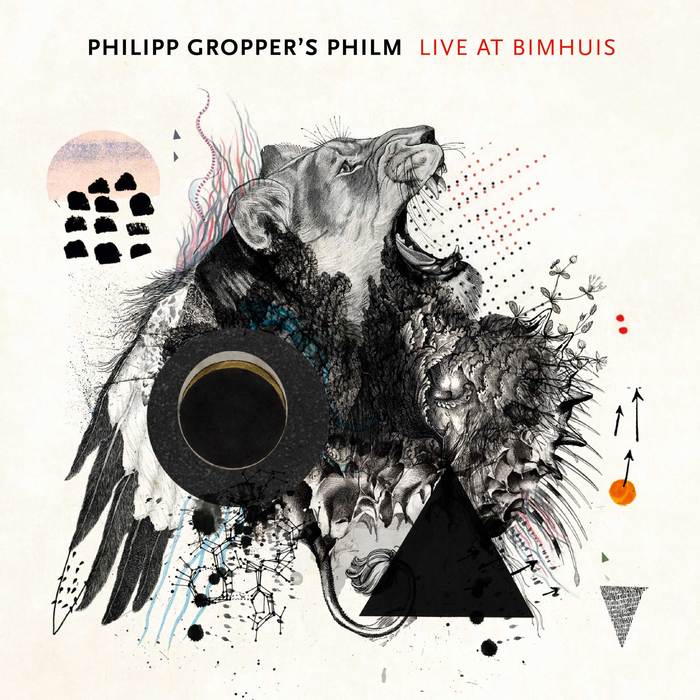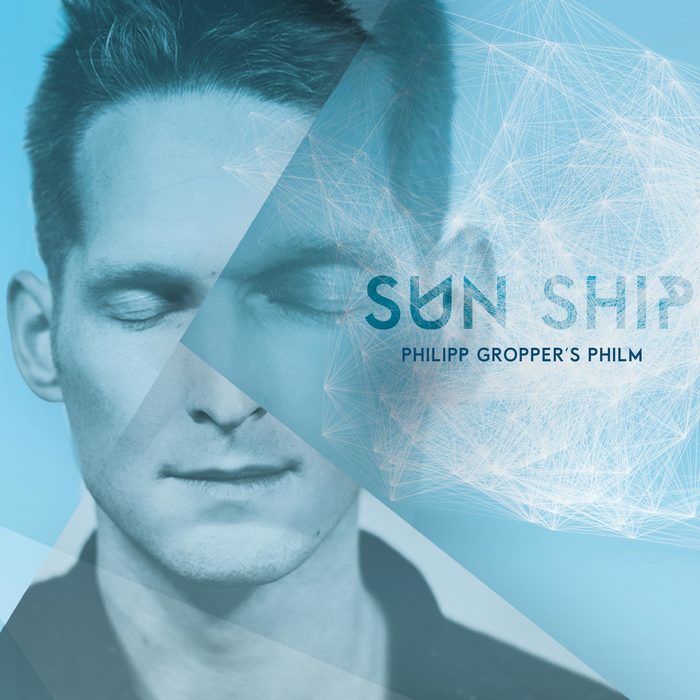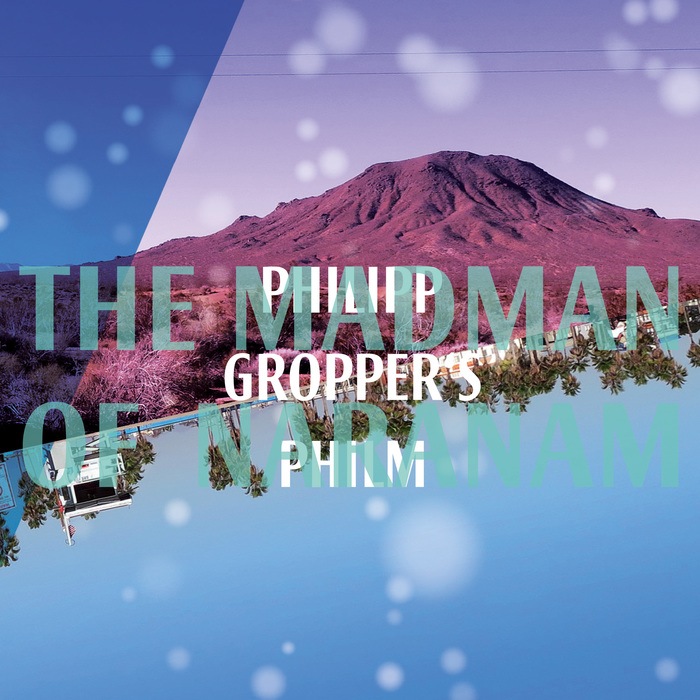Licht by Philipp Gropper’s Philm
2012 WhyPlayJazz (RS007), CD + MP3 Album Download
Line-up
Philipp Gropper (ts, comp), Andreas Lang (b), Oliver Steidle (dr), Håvard Wiik (p)
Production credits
All compositions by Philipp Gropper. Recorded by Marco Birkner on October 27th 2011 at Studio P4, Berlin. Mixed and mastered by Marco Birkner June 2012 at Studio P1, Berlin.
PHILIPP GROPPER’S PHILM is the third project of the „exceptionally gifted Berlin saxophone player“ (David Friedman), aside from the trio „Hyperactive Kid“ which tours worldwide and the orchestral/electronical concepted band „Gropper/Zoubek/Eldh/Schröteler“. LCHT„Light“ is Gropper’s first album in his own name.
On this very intense album it is clear that there is a strong preference for extraordinary, surprising compositions and images. The six tracks offer an insight into the very own musical world of the composer and improviser.
Licht: „A beam of light cutting through a room, seen from various perspectives, close up and from afar, travelling with it or remaining in one spot.“
Robot: „Visualizing the strange movements of a robot, as it follows its own pulse.“
Club 49: „Dedicated to a small bar in Kreuzberg. No sooner than one steps inside, one is lost.“
„Each of the tracks composed by Gropper, tell their own, individual story and – this goes without saying – it happens in a strictly abstract manner.“ (Rudi Mahall)
Concerning his approach to the classical formation of a quartet, Philipp Gropper remarks: „The longer I play music, the more clearly I perceive the impact of a group, which message it emits.
For me, this essence, which can be experienced through the transcendant quality of music, is what it is all about, and this is absolutely independent of style or instrumental and personal equipment. Sole virtuosity, flights of intellect and the tendency of our time to use softening agents bore me – what I want is directness and mysticism.
I am deeply connected to tradition and constantly try to understand and carry forth its liveliness and freshness – which could only develop in the context of its time; and thus secure the old masters their lasting impact.
Confirming this, Rudi Mahall writes, „what we have here is an obviously very successful crossover from various idols, the result of this experiment being an overwhelming, unmistakeably individual Gropper, immediately distinguishable from his colleagues“.
For more than a decade now Gropper has gained experience on both small and large stages worldwide. Whether he is presenting his own projects or playing as sideman, the list of his musical co-operations speaks for itself: Ralph Towner, Manfred Schoof, Günther „Baby“ Sommer, Mathias Schriefl, Eric Schäfer, Robert Landfermann, Tobias Delius, Tom Arthurs, James Knapp, Carsten Daerr, Wanja Slavin, Kalle Kalima, Peter Herbolzheimer, Kresden Osgood, Rudi Mahall, John Schröder, Maria Joao, Pablo Held, Olaf Rupp, Pierre Borel, Daniel Glatzl, Christian Lillinger, Ronny Graupe and many others.
Last but not least, however, it’s the three sidemen – the Norwegian Håvard Wiik, piano (Atomic, Motiv, Ken Vandermark), Andreas Lang from Denmark, bass (Andromeda Mega Express Orchestra, Gunther Hampel) and Oliver Steidle, drums, Germany (Der Rote Bereich, Peter Brötzmann), who make „PHILM“ sound so convincing. The band seems to breathe as one. They give each other space and have an extraordinary sensitivity for energy and musical flow. Together they carry on the stories started by the compositions.
The album in its poetical diversity defies a hasty musical classification. It tells much more in nuances, of connections between awareness and communication, acting as a catalyst upon themselves.
For the listener, composition is not always distinguishable from improvisation. The intermingled and powerful tracks come to life through their harsh changes, remain unpredictable in their beauty and are full of suspense. Musical images come and go in the Jump Cut. The value of this music is immeasurable.
Reviews
The music presents a set of passionate statements, beautifully crafted by their composer and wonderfully executed by the quartet, which combines four individual talents into a fresh amalgam, where the total is greater than the sum of its parts. Since I'm already familiar with Gropper, Lang and Steidle from other recordings, it is Wilk who is the nicest surprise of this album, playing some superbly imaginative lines and proving to be pianist definitely worth following in the future. Lang plays his usual wonderful bass staccatos and keeps the rhythm section as an integral part of the collective improvisation. Steidle, who is another veteran on the German scene and has a fine reputation as a highly imaginative and gifted drummer justifies his standing in full.
Although most of the music is improvised, it has a strong melodic ingredient, sometimes clearly noticeable but most of the time only present subconsciously. This music has a clearly defined direction and a sense of purpose, which many Free Jazz / Improvised Music recordings simply lack completely. To be completely free and unrestrained within specified harmonic and melodic boundaries is a much more sophisticated form of expression than complete tonal anarchy, something free improvisers tend to forget.
Overall this is an excellent debut group effort and I'm looking forward to hearing more from where this music came from, hopefully soon!
Gropper inszeniert seine Musik wie einen spannenden Spielfilm, dessen Drehbuch unterschiedliche Erzählstränge zu einer schlüssigen Dramaturgie verbindet, die manchmal allerdings etwas überladen wirkt. Immer wieder verdichtet sich die Handlung und ein Akteur nach dem anderen übernimmt die Führung. Oft verändert sich die Szenerie schlagartig. Dann steigt die Spannung, die Atmosphäre nimmt an Intensität zu und das Tempo gewinnt an Fahrt. Wenig später kann die Musik wieder in gemächlicheres Fahrwasser einmünden und die Stimmung ins Beschauliche umschlagen. Philipp Gropper zieht alle Register. [...] Der Berliner spielt ein robustes Saxofon mit angerautem Ton, das sich ausdrucksstark durch die komplexen Strukturen schlängelt. Am Schlagzeug erweist sich Oliver Steidle als virtuoser Dynamiker, der selbst die kompliziertesten Rhythmen und vertracktesten Taktwechsel souverän ins Szene setzt. Der erst 24jährige Pianist Elias Stemeseder lässt dazu seine Finger über die Tasten tanzen, wobei deutlich wird, warum der junge Österreicher bereits vom amerikanischen Stardrummer Jim Black engagiert worden ist. Für ein sicheres Fundament sorgt Kontrabassist Andreas Lang. Sein vitales Spiel verleiht der Musik Druck und Drive.
Somehow, and this is the magic of Licht, Philipp Gropper’s Philm has found a way to reference the improvisational genius of Monk, without forgetting the sense of adventure that always powered his best work. Along the way, they’ve made his ambitions – not just his sound – their own.
Irgendwie kommt dieses Debütalbum überraschend. Denn der Saxophonist Philipp Gropper ist schon für eine so lange Zeit intensiv auf der Szene (zum Beispiel im Trio Hyperactive Kid) präsent, dass man vermuten könnte, er hätte bereits längst seine jazzmusikalische Visitenkarte abgegeben. Doch weit gefehlt. Erst jetzt, im September 2012, hat der 1987 in Berlin geborene Musiker seine erste CD als Leader, „Licht“, veröffentlicht, die er mit seinem skandinavisch-deutschen Quartett mit dem schrulligen Namen Philm aufgenommen hat. Darauf legen die vier Musiker – neben Gropper sind auch noch der dänische Bassist Andreas Lang, der norwegische Pianist Håvard Wiik und der Berliner Schlagzeuger Oliver Steidle zu hören – eine unter die Haut gehende, prickelnd emotionale Improvisationsmusik vor, die ihre Wurzeln in der europäischen Musikkultur nicht verleugnen möchte, dennoch stets auch rüber in die USA linst. „Je länger ich Musik mache, desto wichtiger ist mir und desto klarer nehme ich wahr, was Musik, was eine Band transportiert, welche Botschaft von Ihr ausgeht“ erklärt der Saxophonist. Doch in Groppers mitreißendem Modern Jazz werden die Botschaften nicht in eine fixierte Sprache übersetzt. Die Geschichten, die dieser Vierer so eloquent zu erzählen weiß, scheinen als akustische Bilder in einem Storyboard flüchtig skizziert zu sein: fragmentarisch, disparat und heterogen. Daraus entwickelt sich im Zusammenspiel des Quartetts ad hoc eine moderne Jazzmusik, die gleichermaßen Geschichtsbewusstsein transportiert wie Wege in die Moderne zeigt, die hochemotional, reif und gehaltvoll ist. Das die vier Musiker virtuos auftrumpfende Instrumentalisten sind, das versteht sich von selbst. Vor allem jedoch besitzt Gropper auf dem Tenorsaxophon einen so ursprünglichen, so archaischen und dringlichen „Cry“, der direkt, ohne Umweg und Übersetzungshilfe, die Seele berührt.
Wer facettenreichen Jazz mit Ecken und Kanten mag, der ist hier richtig.
[...] Weder inflationiert er sich noch will er sich vordergründig anbiedern. Die Jazzgeschichte hat er verinnerlicht, immer wieder funkeln Spurenelemente seiner Altvorderen durch seine unvorhersehbaren Improvisationslinien. Doch das ist das Verblüffendste an diesem Quartettalbum mit Pianist Håvard Wiik, Bassist Andreas Lang und Schlagzeuger Oliver Steidle, wie abgeklärt und doch spontan, wie eigenständig und in sich logisch die sechs vertrackten Stücke des Bandleaders daherkommen.
Aber in der Hauptsache geht es hier um die Sophistication eines Musikers, dessen cool gedämpfter, reflektierter Ton sich tatsächlich am besten in Lichtmetaphern fassen ließe - schimmernd, flackernd, schummrig, durchscheinend, leuchtend. Für keines der Stücke genügt ihm ein simples ABC oder breitgetretener Solo-Tutti-Quark.
Philm perform a change between light and shadow, claustrophobia and blasted vastness. Tenor saxophonist Philipp Gropper, submitting the first release under his own name, is the author and genius behind it.
Gropper’s distinctive style that many listeners may be familiar with from the trio Hyperactive Kid finds it continuation in Philm. The sound is a combination of familiar jazz idols and his own vocabulary. This way he manages to develop a recognizable individuality, far from the academically cultivated sound and muffled or screaming “free jazz monotony”.
The elected fellow musicians are an exciting complement and supplement in the greenhouse of sounds.
The virtuosic, powerful, often temperate bass play of Andreas Lang offers a fundamental and attentive accompaniment. At the drums, Oliver Steidle many a time forms a unit with Andreas Lang but at the same time manages to break free. Whether soft pads or hard-edged drumfire – Steidle’s style is powerful, rough and classy at the same time. Both are grooving with a lot of “body” or deconstructing laboriously played passages.
At the piano, Håvard Wiik either makes for an exhilarating counterpoint or performs the necessary incorporation of the band’s sound. Wiik draws extensively on the entire jazz tradition. His play steps forward smoothly and eloquently but can turn into a mysterious, free and delightfully brittle sound.
The quartet is awake and responsive. For the listener composition and improvisation can be hard to distinguish from time to time. The overall very nested and nervous tracks develop harsh context changes. Delivering something beautiful, they are surprising and innovative.
